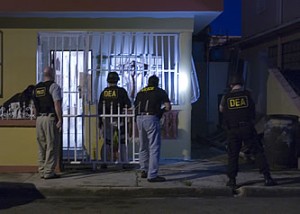 The Supreme Court has eroded a citizen’s right to privacy in his or her own home with its decision in Kentucky v. King. The court ruled that police who smell marijuana at your door may kick your door down if they think you might be destroying those drugs. And by the way, no, they don’t need a warrant, as long as they knock first.
The Supreme Court has eroded a citizen’s right to privacy in his or her own home with its decision in Kentucky v. King. The court ruled that police who smell marijuana at your door may kick your door down if they think you might be destroying those drugs. And by the way, no, they don’t need a warrant, as long as they knock first.
Justice Ginsburg was the lone dissenter. She wrote in her opinion that “The court today arms the police with a way routinely to dishonor the Fourth Amendment’s warrant requirement in drug cases… In lieu of presenting their evidence to a neutral magistrate, police officers may now knock, listen, then break the door down, nevermind that they had ample time to obtain a warrant.”
Justice Alito wrote the majority opinion. He used the notion of “exigent circumstances” to validate the actions of the police in this case. As Justice Ginsburg points out, “circumstances qualify as “exigent” when there is an imminent risk of death or serious injury, or danger that evidence will be immediately destroyed, or that a suspect will escape.” (Brigham City v. Stuart )
The lower court had ruled that the police could not create the exigent circumstances themselves, by banging on the door and announcing themselves. Justice Alito disagreed, holding that Mr. King could have simply told the police that they could not come in. I don’t know what planet Justice Alito is from if he really believes Mr. King had that option. Are we to assume the police would have said “oh, O.K., I guess we can’t come in” and left Mr. King alone?
Justice Ginsburg concurred with the lower court that the police could not themselves create the exigent circumstances that justified the warrantless entry. She wrote that our homes are “our most private space.”
If that’s still true, we’re all in trouble.



